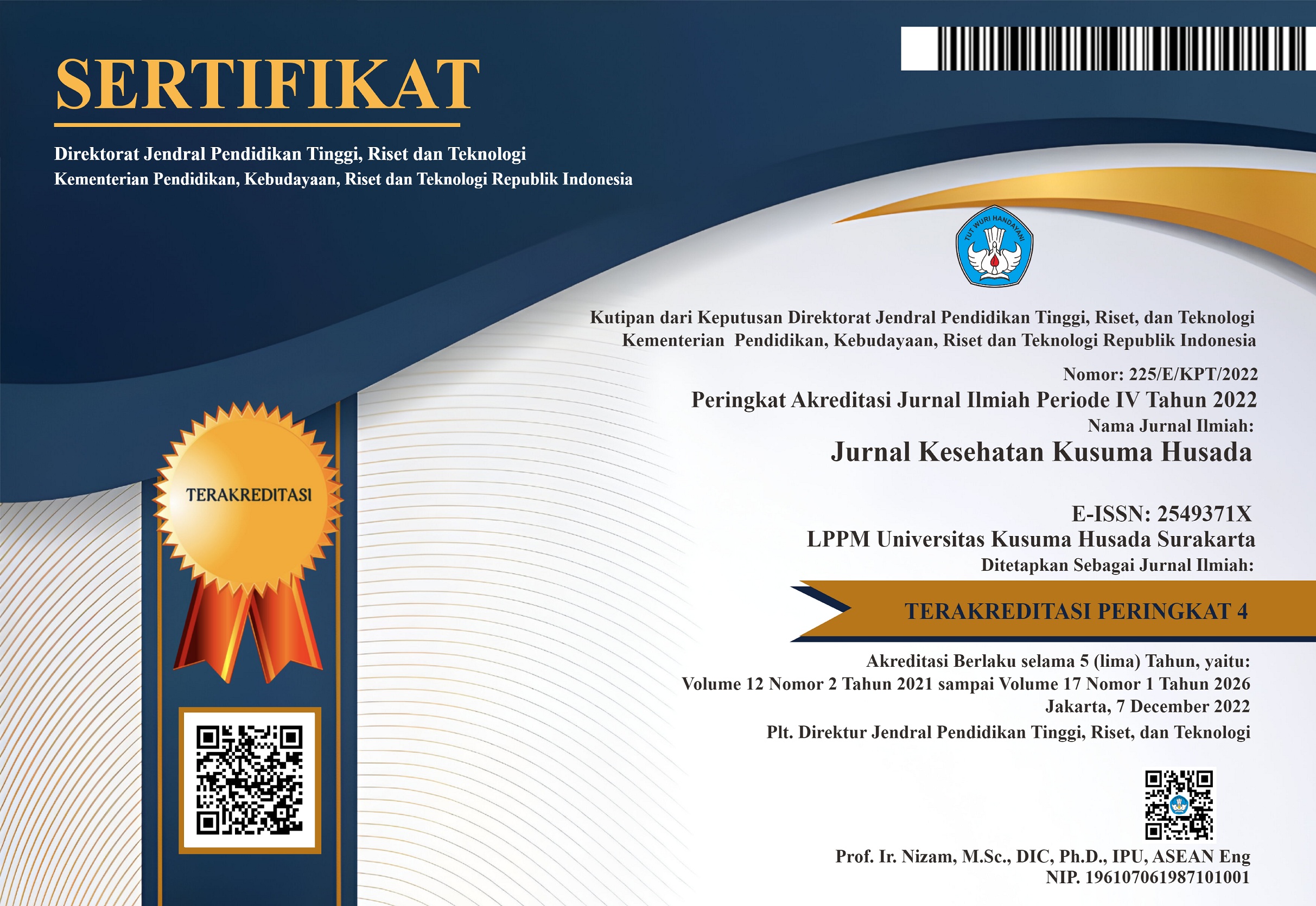ANALISIS TINGKAT DIMENSI KONSEP DIRI TERHADAP KUALITAS HIDUP ORANG DENGAN HIV/AIDS
Abstract
Masalah HIV dan AIDS yang menjadi tantangan kesehatan hampir di seluruh dunia, termasuk di Indonesia. Peran serta ODHA secara fisik dan psikologis sangat diperlukan agar kondisi kesehatannya tidak semakin memburuk. Penelitian ini bertujuan menganalisa tingkat konsep diri terhadap kualitas hidup ODHA yang menjalani perawatan di klinik voluntary consulting and testing (VCT) Rumah Sakit Umum Daerah Soediran Mangoen Soemarso Wonogiri. Pengambilan sampel menggunakan teknik purposive sampling. Sampel penelitian diambil 30 orang, setara dengan 35 % dari penderita yang terdaftar dalam layanan selama periode pengumpulan data. Desain penelitian adalah deskriptif analisis kuantitatif dengan pendekatan cross – sectional. Instrumen pengumpulan data menggunakan kuesioner tentang konsep diri dan WHOQOL-HIV BREF. Data yang diperoleh diolah dalam spreadsheet Excel dan diekspor ke SPSS versi 17.0 program. Hasil penelitian responden dengan konsep diri rendah yang mempunyai kualitas hidup tinggi adalah 5 orang (16,7%), rendah 12 orang (40,0%), responden dengan konsep diri tinggi mempunyai kualitas hidup tinggi adalah 9 orang (30,0 %), rendah 4 orang (13,3 %). Hasil chi square test menunjukkan p = 0,030 > 0,05 yang berarti ada hubungan yang signifikan antara konsep diri dengan kualitas hidup. Kesimpulan penelitian ini adalah tidak ada hubungan yang signifikan antara diri fisik, diri keluarga, diri sosial dan kritik diri dengan kualitas hidup akan tetapi ada hubungan yang signifikan antara diri moral etik dan diri pribadi dengan kualitas hidup meskipun derajad hubungan masih rendah. Ada hubungan yang signifikan antara konsep diri dengan kualitas hidup. Penelitian ini mempunyai kontribusi dalam peningkatan dimensi konsep diri yang mempengaruhi kualitas hidup melalui kegiatan pada Kelompok Dukungan Sebaya (KDS) dalam bentuk penyuluhan kesehatan, peningkatan ketrampilan dan diskusi dalam FGD.
HIV and AIDS being a health challenge in almost all over the world, including in Indonesia. The role of PLWHA in physical and psychological is very necessary. This study aims to analyze the level of self-concept of the quality of life of people with HIV / AIDS who undergo treatment at the voluntary consulting and testing (VCT) clinic of the Soediran Mangoen Soemarso Hospital Wonogiri. Sampling uses a purposive sampling technique The study sample was taken 30 people. The design of this research is descriptive quantitative analysis with cross-sectional approach. Data collection instruments used a questionnaire about self-concept and WHOQOL-HIV BREF. The data obtained was processed in an Excel spreadsheet and exported to SPSS version 17.0 of the program. The results of the research respondents with low self-concept who have a high quality of life are 5 people (16.7%), low 12 people (40.0%), respondents with high self-concept who have a high quality of life are 9 people (30.0% ), low 4 people (13.3%). Chi square test results showed p = 0.030> 0.05 which means there is a significant relationship between self-concept and quality of life. The conclusion of this study is that there is no significant relationship between physical self, family self, social self and self criticism with quality of life, there is a significant relationship between moral ethical self and personal self with quality of life although the degree of relationship is still low. There is a significant relationship between self concept with quality of life. The contribution of this research is to increase the dimensions of self-concept that affect the quality of life through activities in the Peer Support Group (KDS) in the form of health education, skills improvement and discussion in the FGD.
The copyright of the published articles belongs to Jurnal Kesehatan Kusuma Husada.

This work is licensed under a Creative Commons Attribution 4.0 International License.











